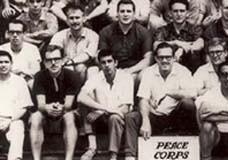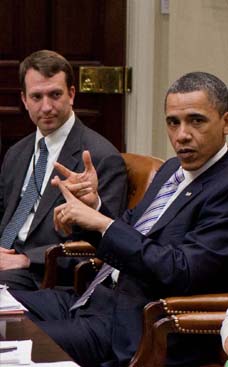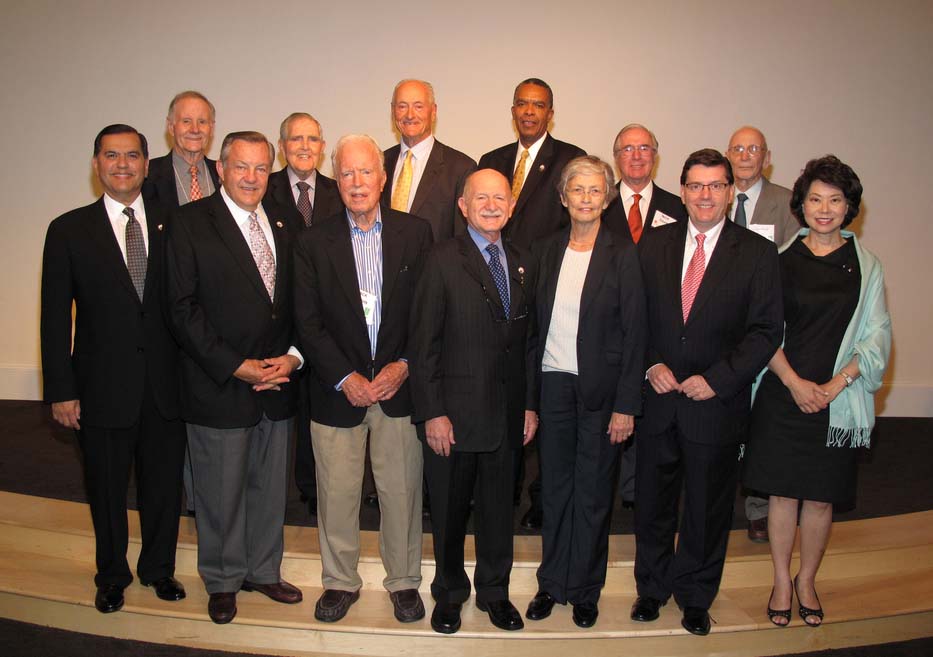
Leadership is an overworked term. Nevertheless, it is of overwhelming importance to any program that depends upon human motivation. If the Peace Corps is to help other societies develop, it demands staff who can inspire the volunteers commitment in the depths of disillusion, who never forget-and never allow the volunteers to forget-why they stepped forward. Sargent Shriver and Jack Vaughn demonstrated that the Peace Corps director can have enormous impact on volunteers and programs through the staff hired and the standards enforced. Invariably, successful Peace Corps programs have had superior directors-superior in their ability to fit volunteers to the country's needs and superior in their ability to provide them with a credible rationale for their presence. The first lesson of the Peace Corps is leadership: at the top and in the field. Read this profile of the leadership styles of Shriver and Vaughn, two of the best Peace Corps Directors, and how they inspired and infused a sense of purpose into the early Peace Corps, providing an example for directors that followed.
Fifty Years of Peace Corps Leadership
Lessons in Leadership
An Excerpt from "Keeping Kennedy's Promise" by C. Payne Lucas and Kevin Lowther
Caption: All of the living Peace Corps Directors convene at the Peace Corps Staff Reunion on September 23, 2011. Pictured left to right: Gaddi Vasquez, Joe Blatchford, Ron Tschetter, Kevin O'Donnell, Jack Vaughn, Richard Celeste, Mark Schneider, Aaron Williams, Carol Bellamy, Nick Craw, Mark Gearan, Don Hess, Elaine Chao. All photos courtesty of the US Peace Corps.
The Peace Corps often seems to categorize the volunteers into those who excel and those who don't, without much regard for the beneficial effects of strong leadership.
Anyone who would understand the Peace Corps must first understand the meaning of leadership within that unique federal agency; and anyone who would understand that must first study the executive genius of the Peace Corps first director, R. Sargent Shriver.
Shriver was foremost an energy source. He radiated a sense of purpose that infused all who were drawn into his embryonic universe of peace and brotherhood. Dubious congressmen, a fretful Foreign Service, skeptical columnists, potential volunteers, and prospective host governments-all fell under the sway of his uncompromising idealism.
Appointed by the president in March 1961 to conduct the Peace Corps experiment from scratch, Shriver epitomized the New Frontier better than anyone else among Kennedy's cadres. It helped to be the President's brother-in-law, but it was more important that he was Sargent Shriver and possessed of an almost inexhaustible capacity for hard work.
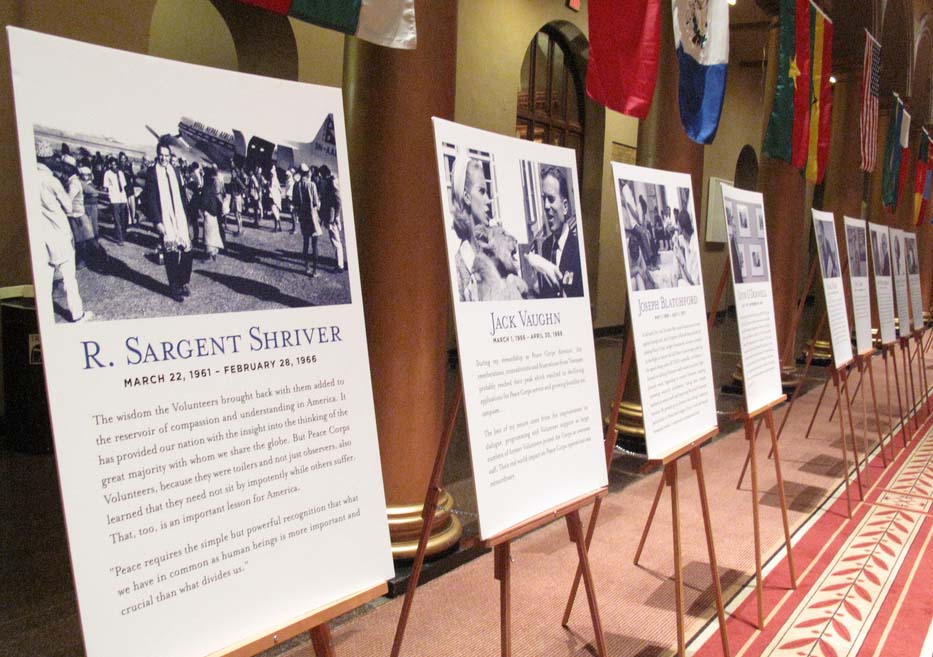
Caption: Biographies of all the Peace Corps Directors starting with Sargent Shriver in 1961 at the Peace Corps Staff Reunion on September 23, 2011.
Shriver's vitality surged through the halls of the Maiatico Building in Washington, where the Peace Corps began setting up shop and where years earlier the nations foreign aid program had taken shape. Mail clerks, secretaries, and division chiefs willingly labored long into the nights. The cover of a vintage Peace Corps pamphlet said it all: there was the agency's twelve story headquarters-overlooking Lafayette Park-every window lit up at night as though it were on fire. And it was. Unless you blazed with the same zeal as Shriver, you belonged elsewhere, not down at 806 Connecticut Avenue burning up your week-nights and weekends because Sarge needed you. The Peace Corps, after all, was not a job. It was a way of life. It was tomorrows world made better, and Shriver's staff were determined to be no less dedicated to that vision than the volunteers they were selecting, processing, training, immunizing, and flying to places named Kabul and Kuala Lumpur.
Shriver enjoyed the invigorating presence of strong-willed personalities among his associates. He believed from the outset that the Peace Corps would require the finest staff available and set out to recruit men and women who, though relatively young, had established themselves in their fields as exceptionally bright and innovative. Whatever they were doing at the time, when Shriver called to say that it was more important that they work for the Peace Corps, they came.
Some of the most powerful staff members, however, were experienced bureaucratic infighters who transferred to the Peace Corps from the foreign assistance program. Among them were Warren W. Wiggins, William Josephson, John Alexander, and others who saw the new agency as a means of revolutionizing the delivery of American aid to the developing world. Wiggins, the man most responsible for setting the Peace Corps on the track of rapid growth, became director of program development and operations the effective center of power in the early years. Josephson, a brilliant young lawyer, first served Shriver as a special assistant before taking the general counsels chair another pivotal position in so new an organization. No ones judgment, no matter what the issue, was more highly valued by Shriver. The tough-minded Alexander supervised the steady expansion of programs for Africa's newly independent nations.
These men were joined by dozens of people who brought with them charisma and administrative expertise in equal measure. Jack Vaughn, a deceptively shy foreign aid veteran, became regional director for Latin America under Wiggins and later succeeded Shriver; Bill Moyers, Vice-President Johnson's young protégé, managed the agency's public affairs office;
Harris Wofford, a sort of one-man Peace Corps think-tank and Shriver confidant, graduated to college presidencies. Frank Mankiewicz was another recruit, and would later achieve national prominence as columnist and press secretary in the presidential campaigns of Robert F. Kennedy and George McGovern. Charles Peters, who served many years as the Peace Corps director of evaluation and as its conscience, subsequently began the successful Washington Monthly magazine. Two leading black staff members were Franklin Williams, a civil rights lawyer and former assistant California attorney general, who first directed the agency's relations with private organizations before becoming African regional director; and George Carter, who came over from the American Society for African Culture to head the office for North Africa! Near East! South Asia operations.
Shriver found the originals he sought and then, to get the most from them, set them in positions of creative competition with one another. Although this strategy helped make the Peace Corps dynamic and fertile, it also provoked internecine warfare in Washington, frequently at the expense of the overseas programs. The regional offices especially lobbied their own causes without reference to the good of the larger Peace Corps mission. There were often disputes over the allocation of the best volunteers. The Africa office outplayed its Latin America and Asia counterparts in the art of having Jeeps assigned and shipped to its outposts. Recruiters were not above influencing applicants to request assignment to a favored country or region even though they were more urgently needed elsewhere. And inevitably a we/they attitude developed in the relationships between Washington and the overseas staff.
Shriver tried to correct the latter problem by adopting a liberal home-office consultation policy for country directors and by encouraging Washington staff to visit the field. Beyond that, he made it very clear that the Peace Corps worked abroad, not in Washington. Volunteers and overseas staff thus occupied a special pew in Shriver's church.
There was no greater honor in the early Peace Corps than to serve as a country "rep" (representative) or in any other field position. Shriver knew that the success of the volunteers and therefore of the Peace Corps depended on the field staff. Shriver personally interviewed and approved anyone, including most secretaries, who was to be posted overseas. It was the typical Shriver touch, inspiring staff to excel "for Sarge" but also inspiring blind loyalty, which caused some to say and do things they thought would please the director.
When he was not logging mega-mileage by air or by washboard roads visiting hundreds of volunteers, Shriver stayed constantly and closely informed about the state of overseas programs. The reps were instructed to write regular letters directly to Shriver, discussing the day-to-day highs and lows of their operation. For a time they also sent monthly tape recordings, in which they were supposed to level with Shriver regarding serious deficiencies among the volunteers programs or special problems they might be encountering with the U.S. ambassador, the host government, or Peace Corps/ Washington. They were also expected to record vignettes of volunteer achievement that could be shared with the White House, Congress, and the media.
Shriver extended his personable style to the volunteers as well. In a very real sense he idolized them, and they in turn regarded him with awe and respect. In addition to visiting volunteers at their work sites he often wrote personal notes to those who had impressed him (just as he was in the habit of writing on his overseas inspections to individual members of Congress).
Without his special charisma, Shriver could not have engineered the organizational miracle that placed volunteers in strange lands, speaking strange languages, in the fleeting space of six months. However, his freewheeling, singularly gifted style distracted attention from serious shortcomings that began to manifest themselves soon after large numbers of volunteers started arriving overseas. Shriver was accustomed to dealing with concrete problems. Establishing the Peace Corps, recruiting talented staff, and the logistics of training volunteers and landing them in jobs were tangible tasks requiring sound organization, a dash of imagination, and, of course, a lot of midnight oil. Shriver and his aides excelled at such assignments.
Less tangible, however, was the problem of sensitizing volunteers to foreign cultures. Mastering dynamics of social and economic development proved (and still proves) an elusive goal for most volunteers. In spite of his extensive contact with volunteers in the field, Shriver never fully appreciated the difficulty they were experiencing in adapting to their surroundings, learning a language, and overcoming innumerable frustrations on the job. He believed that it was the rare volunteer who could not surmount these obstacles and assumed that the great majority of volunteers who stayed abroad and completed their two-year assignments were achieving something worthwhile. In reality, many volunteers remained because they feared the stigma of quitting and facing friends back home or because the country staff feared sending them back for nonperformance lest this reflect negatively on staff leadership.
Had Shriver and other Washington-based officials been less confident in the innate ability of volunteers to make their own way out of various cul-de-sacs, they might have acted more vigorously to correct the inadequacies of the Peace Corps supposedly outstanding language and cross-cultural training. They might have reformed their somewhat casual, laissez-faire approach to the programming of volunteer jobs. And they might have raised the level of skills being transmitted to volunteers.
As early as 1962 and 1963, Peace Corps "evaluators" who had visited a broad cross section of volunteers and listened to local assessments began to stress in their reports that the agency was playing a numbers game: programs were increasing in size by quantum leaps while the quality of those programs and of the volunteers was suffering in consequence.
Shriver examined the same evidence and said he saw no outline of a numbers game. He was the incorrigible optimist. He looked for the best in people. He expected volunteers and staff alike to meet the Peace Corps' unusually high standards. Shriver did not look for trouble; he looked for results. His objective had been to create the Peace Corps against difficult odds, and he did. But in so doing he may have succeeded only too well. The Peace Corps-energized by the Shriver Mystique-had quickly gathered momentum and popularity, at home and abroad, which carried it farther and faster than most people had thought possible. However, it lacked discipline and direction, and that demanded a different sort of leader.
By 1965 Shriver had become almost an absentee landlord at the Peace Corps. Having accepted President Johnson's appointment to head the War on Poverty and the new Office of Economic Opportunity, Shriver was forced to divide his time between the Peace Corps and the infant domestic agency. It was a critical stage for the Peace Corps. At the very moment Shriver should have been making an intensive reassessment after four hectic years of unrestrained growth, the Peace Corps seemed rudderless. Morale declined among both Washington and overseas staff, who were less and less able to consult directly with Shriver. An agency that had become somewhat dependent on the guiding presence of one individual now seemed, in his absence, to be slipping into a bureaucratic mold.
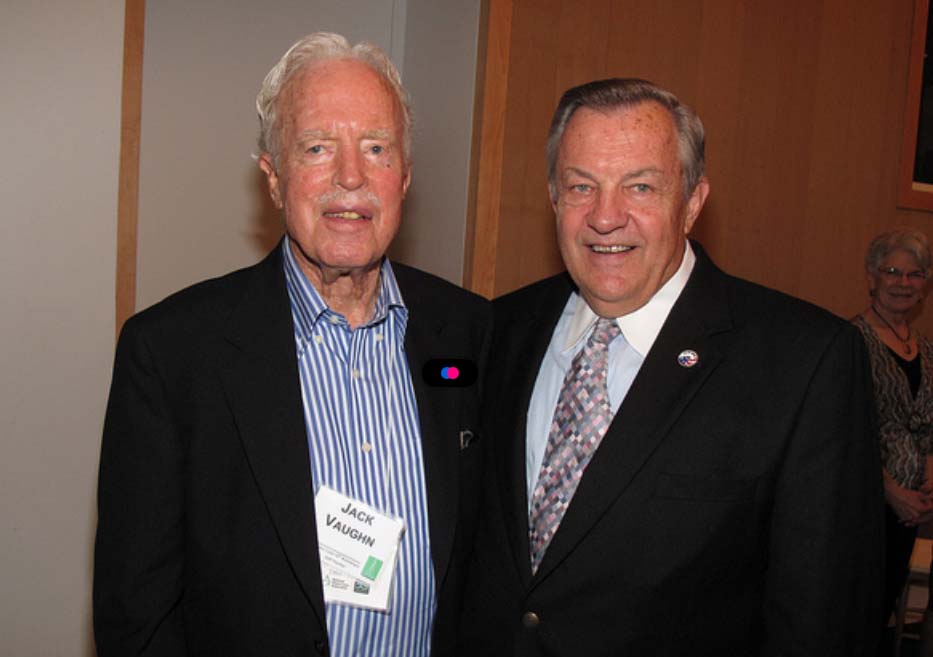
Caption: Former Peace Corps Directors Jack Vaughn and Ron Tschetter at the Peace Corps Staff Reunion.
Shriver's personality cult had outlived its usefulness. A change in leadership was due, but the president put off the matter until an unnamed congressman evidently threatened to make Shriver's dual directorship a public issue. When it was learned that a new Peace Corps director would be selected shortly, speculation within the agency was that it would be someone of national stature who would not be totally eclipsed by Shriver's shadow. Johnson surprised everyone by naming Jack Vaughn. Although Vaughn had left the Peace Corps in 1964 to become ambassador to Panama and was then serving as assistant secretary of state for inter-American affairs, he was little known in the nation. Within the Peace Corps itself he was only slightly more prominent. Vaughn would turn out to be an excellent choice, but it has never been clear why the president picked him. Bill Moyers may have wanted the job. Johnson, however, was not about to let his valued press secretary leave the White House. Vaughn, on the other hand, had reportedly drawn fire in Congress over his role in the U.S. invasion of the Dominican Republic in 1965. Johnson may well have decided he could silence criticism on two fronts by shifting Vaughn whom he knew and liked from the State Department back to the Peace Corps and by allowing Shriver to focus on the poverty program.
Aside from having to follow Shriver, Vaughn faced a host of problems. The war in Vietnam was beginning to escalate and already alienating prospective volunteers who wanted nothing to do with any government program. The civil rights movement and VISTA were competing with the Peace Corps for attention and recruits. And generally the Peace Corps seemed to have lost the flush of the New Frontier. It was but one horizon among many for an adventurous and humane soul to pursue. Applications were down, and it was becoming clear that continued numerical growth was unlikely, that the time had come to consolidate and strengthen the better programs and phase out those that were nonproductive.
Vaughn first had to prove himself to the Washington staff. The old Shriver hands had been traumatized by their hero's departure. They wanted to be assured that the quiet and unassuming Vaughn would exert the same highly personalized leadership as Shriver had. A "silent staff revolt" simmered through mid-1966 (Vaughn had taken charge in March). Discussions centered on Vaughn's capacity to lead, yet all the while Vaughn was moving decisively to reorganize the programming, selection, and training functions for a concerted effort to improve the quality of Peace Corps projects overseas. At the request of concerned staff, Vaughn ultimately spoke to a meeting of the entire headquarters payroll. He explained his own Peace Corps philosophy. It did not differ materially from Shriver's; he merely chose to express it in his own manner. What emerged then and thereafter was that the Peace Corps had reached the point where it would have to mature if it was to accomplish anything of real and lasting impact in the world.
Individual personalities and public relations were less important to that mission than solid programming and better training of volunteers.
Vaughn began running the Peace Corps through a battery of tests. Did the volunteers really have good jobs? Were staff living frugally? Were all those vehicles necessary? Were volunteer living allowances too high? How good were their language skills? Did volunteers and staff really understand the host culture?
Vaughn also began assembling his own team. The major Shriver holdovers gradually left, to be replaced by the best among the middle rank of Shriver appointees. This assured continuity as well as loyalty to Vaughn's plan of action. The most awkward position to fill was that of deputy director. Warren Wiggins had been Vaughn's superior in the first days of the Peace Corps. He had been as responsible for building the Peace Corps as Shriver had. Now he would have to go in favor of the low-keyed director of the program in India, Brent Ashabranner.
The latter choice was a sign that Vaughn would not surround himself with the young lions that had cavorted around Shriver. He wanted capable and intelligent senior staff, but he did not want aides who thrived on bureaucratic gamesmanship. To underscore the point he dispersed the life-and-death power over programs to the four regional offices Africa, Latin America, East Asia/ Pacific, and North Africa/Near East/ South Asia. No longer would they have to jockey for volunteers in the central programming and operations office originally headed by Wiggins.
Vaughn's chief difficulty in asserting his control of the agency was more a matter of style than substance. For all his long experience in Latin America and Africa, for all his cultural empathy and fluency in French and Spanish, for all his dry sense of humor, Vaughn remained to most Peace Corps staff and volunteers a distant and undimensional character. Shriver reached people through seismic waves of personality that extended far and wide. Vaughn reached people through eye contact, always firmly engaged with whomever he was talking to. It took a long time for such a man to obtain the degree of personal staff commitment that Shriver had enjoyed virtually from the start.
Vaughn truly became the Peace Corps director, in the eyes of many volunteers and staff, when he spent two weeks visiting the restless volunteers in Nigeria, some of whom were threatening a sit-down strike. The Nigeria program had been chronically understaffed. The 700 volunteers scattered throughout the enormous country felt neglected and unsupported by the Peace Corps, which was suddenly closing down the hostels it operated for their convenience and clamping strict controls on the use of motorbikes. In the background, meanwhile, Nigeria was disintegrating amid grisly communal violence and military coups. The volunteers wanted to air their grievances, and they wanted Vaughn to come from Washington and listen.
After much debate in Washington, Vaughn decided to go. He was anxious not only to avert a volunteer strike, which would have had devastating consequences for the Peace Corps at home and in other countries, but also to reaffirm to the State Department his agency's prerogatives and de facto independence. (State was trying at the time to influence the assignment of volunteers in Nigeria and wanted the Peace Corps to evacuate its program from the Eastern Region, which seceded several months later as "Biafra." Vaughn said with finality that such a decision would be up to the Peace Corps.)
If he did not realize it beforehand, Vaughn discovered in Nigeria that he had inherited a Peace Corps lacking much of its original grit. The morning after his arrival in Lagos, Vaughn summoned a meeting of the Peace Corps staff. Few of them knew Vaughn. They sat stone-faced as he embarked on one of his patented pep talks about the importance of staff leadership. He conceded that Peace Corps/Nigeria had never received staff sufficient to manage such a large program. But he was certain they could be doing a better job at staying in contact with the volunteers and insuring that they had enough work to keep them happy. "I never get letters of complaint from Volunteers who are busy doing something", Vaughn said, "who are teaching thirty hours a week."
Vaughn had cut to the marrow of the Peace Corps' major problem worldwide. Too many volunteers were being wasted in poorly planned assignments. Too many volunteers were more concerned with proposed reductions in living allowances, vehicle restrictions, and the closing of hostels than they were with the work they had come to do. Too many volunteers had forgotten the meaning of their Peace Corps commitment.
Stay where the Nigerians stay, Vaughn said, the Peace Corps is not in the hotel business. Forget the motorbikes the Peace Corps gave you in a period of misguided generosity. Travel with the Africans, Vaughn said in effect, or better yet stay in your town and get to know the people rather than escaping on weekends to visit other volunteers.
Vaughn listened to the volunteers. He told them when he thought they were right, and he told them when he thought their demands were unreasonable and incompatible with being a Peace Corps volunteer. He told them why they had joined the Peace Corps and come to teach in Nigeria. He told them in moving, human terms the meaning of their presence there, and that was something Vaughn could do perhaps better than anyone else.
There was to be no sit-down strike (if, indeed, the volunteers had been that serious). Many volunteers probably shared the reaction of a young woman who told a staff member after hearing Vaughn: "He expressed the enthusiasm that I first felt when I joined the Peace Corps. It was good to know that he has it. After hearing him talk, I felt it again."2
Vaughn's performance in Nigeria set to rest many of the lingering doubts in Washington about whether the Peace Corps had a leader. More important, the revelation of the large Nigeria programs weaknesses had confirmed Vaughn's worst suspicions about the need to improve the quality of agency programs. He would devote the remainder of his tenure as director to making program development in the field and program review in Washington a professional process. It was the most necessary of his contributions to the Peace Corps.
Vaughn was also a stern disciplinarian. He angered many volunteers with his absolute ban against beards, especially in Latin America. His concern over the sloppy appearance of some volunteers seemed less eccentric to observers familiar with the casual attire common among Peace Corps personnel. But the most troublesome issue involved volunteer's dissent on U.S. policy in Vietnam.
Vaughn sympathized with the peace movement privately but showed little tolerance for volunteers who expressed their opposition openly abroad. They threatened to politicize the Peace Corps in foreign eyes, entangle the agency in an issue that could only harm it, and enrage a hypersensitive president. Thus, when a volunteer in Chile-where the Vietnam war was a hot political topic-wrote a letter to a Chilean newspaper protesting the war, Vaughn had him summarily terminated. Vaughn was infuriated that the volunteer had been willing to sacrifice the Peace Corps apolitical reputation for the sake of expressing his own opinion. By expelling the volunteer, however, he signaled to thousands of potential volunteers that the Peace Corps was hostile to free speech and that it was an integral part of the untrustworthy federal establishment.
Vaughn cherished his years at the Peace Corps. To him, nothing better embodied the brotherhood of man. It never sounded trite when Vaughn said the Peace Corps meant love. And whenever someone threatened the Peace Corps through a thoughtless or selfish action, he defended it with a lover's passion.
Leadership is an overworked term. Nevertheless, it is of overwhelming importance to any program that depends upon human motivation. If the Peace Corps is to help other societies develop, it demands staff who can inspire the volunteers commitment in the depths of disillusion, who never forget-and never allow the volunteers to forget-why they stepped forward.
Shriver and Vaughn demonstrated that the Peace Corps director can have enormous impact on volunteers and programs through the staff hired and the standards enforced. Invariably, successful Peace Corps programs have had superior directors-superior in their ability to fit volunteers to the country's needs and superior in their ability to provide them with a credible rationale for their presence.
The first lesson of the Peace Corps is leadership: at the top and in the field.








